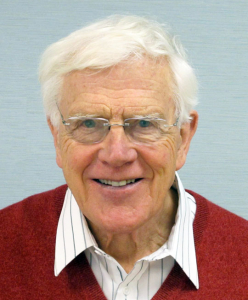 To our patients and members
To our patients and members
February 3, 2013
from the desk of the Chair of the International Geriatric Radiotherapy Group (IGRG)
Allow me to introduce myself. My medical career has now spanned 46 years, of which the first 20 as a professor in teaching and research, the next 20 as a radiation oncology professor treating patients at universities, and the last 6 in smaller clinics in several USA states
My background spans basic science research and administration, clinical research and administration as well as many of the clinical off-shoots of traditional photon/electron radiotherapy, e.g. brachytherapy, hyperthermic ultrasound and microwave treatment techniques, as well as familiarity with proton-, photo- and nuclear therapy modes. Now at the mature age of 77 I consider myself competent to chair this group and help it get started.
The dual background in Swedish and US health care systems has provided me with an international mindset for some of the cultural differences that IGRG needs to embrace to be heard and believed in a global health care forum. Examples are entry into the discipline as patients, need for more efficient treatment regimens, better outcome data from treatments, collaboration with other surgery, chemotherapy, social institutions as an intimate communication with primary health care providers.
My role in IGRG should be to facilitate member participation in research data compilation and publishing endeavors, but also to provide a communication link to professional associations with similar agendas in order to allow our insights to mesh with the global community of health care providers.
It is a pleasure and challenge to accept this position in the group. The future offers many opportunities to improve health care for a patient group that is not only increasing in numbers but also faces social challenges. Among the different oncologic disciplines, the radiation oncologist often provides a crucial element of curative as well as palliative help to the elderly patient, at a time of her/his life when continued quality of life is both questioned and of premium importance. We want to accomplish this is well as to help make the process affordable for everybody without exception.
Cancer treatments with subatomic particles have become more successful since being introduced in the early 20th century. Many technical and biologic advances have contributed to this radiotherapy discipline. It is now considered to be an essential tool not only to eradicate cancer cells from the body but also to spare normal organs from the damaging effects of radiation.
The concept is comparable to our unwillingness to get sunburns but also to want vitamin D benefits from modest sun exposure. The underlying reason is that ‘too little is inefficient, just the right amount is beneficial, and too much is harmful’ (= the hormesis effect. that is operational in most of our medications as well as for effects from many chemicals).
It is now evident that radiotherapy is standard treatment in many curative and palliative treatments for cancer. Some cancers are still difficult to cure, but advances in radiotherapy have helped to improve outcomes, e.g. for lung, colon and brain cancers.
All patient ages have benefited from these advances but the reason for the founding of the IGRG ( lnternational Geriatric Radiotherapy Group) is that its members believe this older age group deserves special attention when it comes to need for radiotherapy.
The populations of civilized countries enjoy longer lifespans at the same time cancer is more common with higher ages. For some time our group has come to believe that the geriatric population of patients, as compared to younger
patients, has become more health care challenged by not being offered radiotherapy. The reasons for this inequality are, in our opinion, responsible physician’s ‘educated guesses’ on patient lifespan and vulnerability to radiotherapy complications as well as society’s concerns for the social impact of a long treatment period on the elderlies’ quality of life.
Politically, there is no argument that age alone should not influence the right to evidence based radiotherapy, since biologic age must trump chronologic age. Society’s responsibility to provide means for health care delivery is a continuing challenge in many countries and need for better infrastructure is imperative. Housing patients at treatment facilities has been a recent and important advance in that respect.
A known fact is that children receiving radiotherapy have side effects and complications at lower doses than adults. Our group is of the opinion that elderly tend to have fewer side effects than younger patients. This concept is not yet universally embraced.
We believe, and want to provide evidence for, that by research efforts, that the turn-over rate in elderly’s bodies is slower not only than in children but also slower than in adults. Although evidence for the association between cell turn-over rates is still sparse, the comparison with children’s and adults tolerance levels combined with our clinical experience provides indications for that the elderly can tolerate radiotherapy at least the same and often better than younger adults.
Some recently published research agrees with this hypothesis. Research on turn-over rates in nail and skin cells so far provide ample indications. Ingenious atomic (carbon-14) research methods may provide additional evidence in the future. If verified, it may even be possible to use additional doses of radiotherapy if this hypothetical concept can be verified for organs in general, and thus increase the probability for improving cure rates when normal organs are spared.
Therefore, our group wants to increase knowledge about radiotherapy for elderly, not only for patients but also for our colleagues and society decision makers. We aim to provide objective data that makes radiotherapy less an art and more a science. Our diversity of membership spans both countries and continents, allowing an international breadth of knowledge to penetrate the health care community.
Ulf L. Karlsson M.D., Ph.D.
Marshfield Clinic, Wl 54449, USA